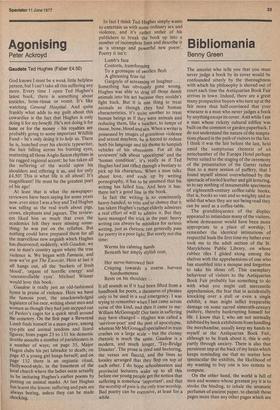Agonising
Peter Ackroyd
Gaudete Ted Hughes (Faber £4.50)
God knows I must be a weak little helpless person, but I can't take all this suffering any more. Every time I open Ted Hughes's latest book, there is something about testicles, bone-tissue or vomit. It's like watching General Hospital. And quite frankly what adds to my guilt about this cowardice is the fact that Hughes is only doing it for my benefit. He's not doing it for fame or for the money his royalties are probably going to some important Wildlife Fund — he's only doing it to help us. There he is, hunched over his electric typewriter, the hair falling across his burning eyes, muttering all those Anglo-Saxon rhythms in his rugged regional accent: he has taken all the suffering of the world upon his shoulders and offering it us, and for only £4.50! This is what life is all about! It's magnificent! He must be the greatest poet of his age!
At least that is what the newspaperreviewers have been saying for some years now, ever since I was a boy and Ted Hughes was telling us the real truth about pigs, crows, elephants and jaguars. The reviewers liked him so much that even the academics felt they were missing something: he was put on the syllabus. But nothing could have prepared them for all the marvellous new anguish which Hughes has discovered; suddenly, with Gaudete, we are in Man's country again where the true violence is. We began with Fantasia, and now we've got The Exorcist. Here at last it all hangs out, all the 'buckets of fresh blood', 'organs of horrific energy' and 'uncontrollable eyes'. Michael Winner would love this book.
Gaudete is really just an old-fashioned hymn in praise of violence. Here we have the famous poet, the unacknowledged legislator of his race, writing about men and women as though they had just stepped out of Pavlov's cages for a quick stroll around the cemetery. On the first page a Reverend Lumb finds himself in a mass-grave, among eye-pits and animal tendons and lizard
• figures; from pages 23 to 131 his demonic double assaults a number of parishioners in a number of ways; on page 35, Major Hagen clubs his pet labrador to death; on Page 45 a young girl hangs herself; and on Page 132 there is an orgiastic ritual, Hollywood-style, in the basement of the local church where the ladies seem actually to be imitating Hughes's earlier poems by Putting on animal masks. At last Hughes has learnt the lesson: suffering and pain are always boring, unless they can be made shocking. In fact I think Ted Hughes simply wants to entertain us with some ordinary sex and violence, and it's rather unfair of his publishers to break the book up into a number of incomplete lines and describe it as 'a strange and powerful new poem'. Poetry it isn't: Lumb's face Contorts, transforming To a grotesque of swollen flesh A glistening friar-fat Gargoyle of screaming or laughter . . .
Something has obviously gone wrong.
Hughes was able to drag all those dumb animals into his act because they couldn't fight back. But it is one thing to treat animals as though they had human characteristics, it's quite another to treat human beings as if they were animals and reducing them, like a butcher, to lumps of tissue, bone, blood and sex. When a writer is possessed by images of gratuitous violence and sexual mayhem, he is forced to reduce both his language and his theme to lumpish
vehicles of his obsessions. For all the
reviewers' talk about 'apocalypse' and the 'human condition', it's really as if Ted Hughes had just rifled through a bestiary to pick up his characters. When a man talks about love, and ends up by writing pornography, it has to be assumed that his writing has failed him. And here it has: there isn't a good line in the book.
In fact the writing is so consistently heavy-handed, so trite and so clumsy that it has taken Hughes's rather elderly admirers a real effort of will to admire it. But they have managed the trick in the past: heavy writing can always be mistaken for serious writing, just as rhetoric can generally pass for poetry in a poor light. But surely not this time: Warms his calming hands Beneath her amply stylish coat.
Her nerve-harrowed face Crisping towards a coarse harvest handsomeness Rests on his shoulder . • .
It all sounds as if it had been lifted from a handbook for poets, a thesaurus of phrases only to be used in a real emergency. I was trying to remember when I last came across verse of this kind, and then it came to me: William McGonagall! Our taste in suffering may have changed — Hughes was called a 'survivor-poet' and the post of apocalypse, whereas Mr McGonagall specialised in train crashes on a large scale — but the clumsy rhetoric is much the same. Gaudete is a modern, and much longer, 'Tay-Bridge Disaster'. The prose is tired and hectoring, the verses are flaccid, and the lines so loosley arranged that they flop on top of each other. I do hope schoolmasters and provincial lecturers wake up to all this before our young people get the notion that suffering is somehow 'important', and that the worship of pain is the only true worship. Bad poetry can be corrosive, at least for a while.


































 Previous page
Previous page